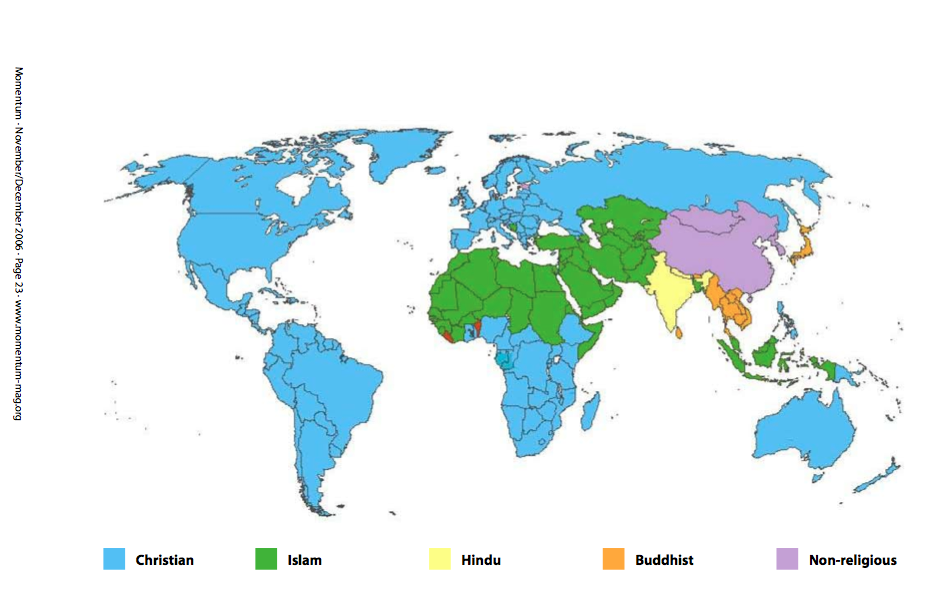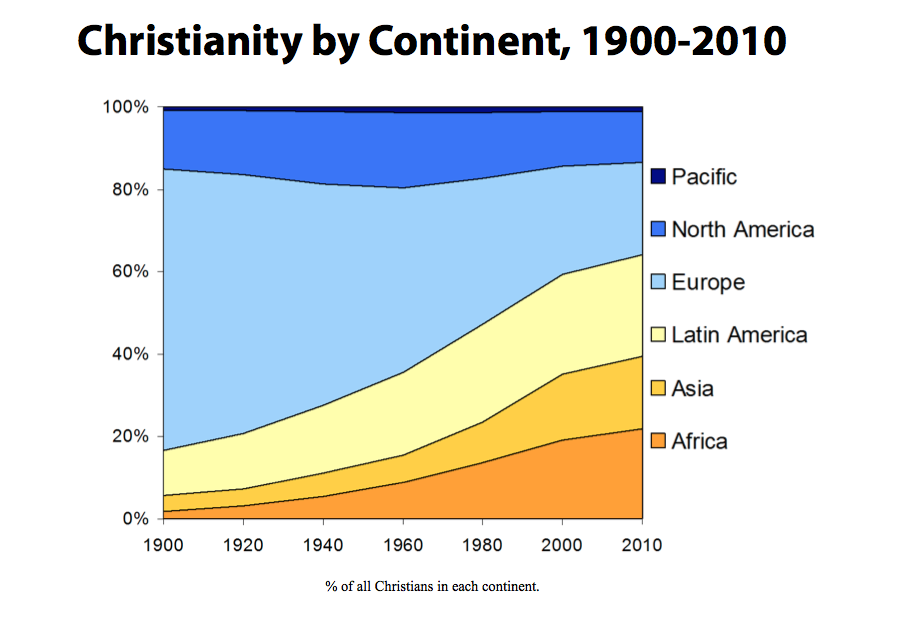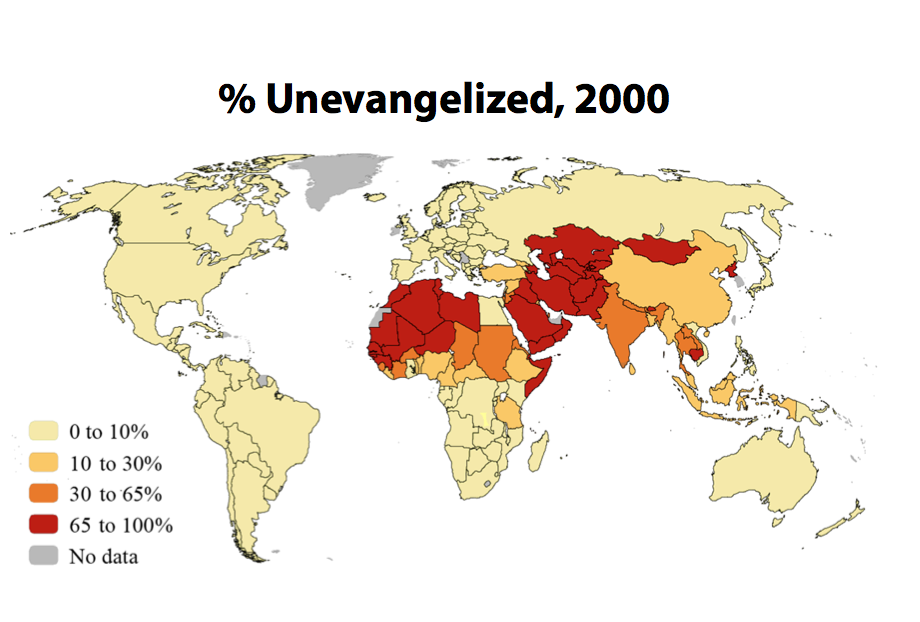I sure have. Many a time. And the more I learn about God, the more I realize that this life we live is more about Him, than about me. I’ve come to realize, to put it simply, that we exist to know God, and to make Him known. I’ve also come to understand that the fullness of God was expressed in a man named Jesus.
Yes, God actually came down to earth in a man named Jesus Christ, that we might know him personally, and then He sent us to make God known to the world. This is the essence of missions.
Maybe you’re also like me in that you notice some interesting things about how people live out this mission. We think of missions as men dressed in suits knocking on doors, or people traveling to meet needs in other countries. We talk about missions relating to recent news – natural catastrophes, people who are oppressed, injustices, civil wars. In this, we are basically saying, “I bring you bad news of sad problems.”
But the gospel begins with, “I bring you good news of great joy!” Why? Because even more than knocking on doors and meeting needs, missions is an invitation to take part in the story of what God began and what He will finish, to join with God has He pursues His purpose in the world.
It’s important that we understand this first, because if we’re only compelled by the needs that we see, mission will lead to a sense of overwhelming duty, and we will be constrained by the insufficiency of our resources at a task far greater than we can fulfill.
So mission is first and foremost about vision – we have to understand who God is and what He is trying to accomplish in the world. We cannot devote ourselves to that which we can’t see. My understanding of this has been shaped by a course I took this spring called the Perspectives in the World Christian Movement, which teaches the biblical, historical, cultural, and strategic perspectives of God’s global purpose. This course is taught all over the country and I highly recommend any opportunity you get to take it. It will rock your little Jesus world. Seriously. Perspectives gave me new eyes to see the world around me – which is so important because we cannot devote ourselves to that which we can’t see.
I started to understand that the bible is far more about God, than it is about people. It’s not simply a disjointed collection of stories and statements, but it is a single driving saga of what God began and what He will finish, and that mission is the thread that holds the bible together. The reality is the God of mission has a church in the world, rather than the Church has a mission for God in the world. Do you see the difference?
John Piper said, “Missions is not the ultimate goal of the church. Worship is. Missions exists because worship doesn’t. Worship is ultimate, not missions, because God is ultimate, not man. When this age is over, and the countless millions of the redeemed fall on their faces before the throne of God, missions will be no more. It is a temporary necessity. But worship abides forever. Worship, therefore, is the fuel and goal in missions. It’s the goal of missions because in missions we simply aim to bring the nations into the white-hot enjoyment of God’s glory.” (John Piper, "Let the Nations Be Glad!")
Missions exists because although God created everyone and everything in complete harmony with himself, humans chose to rebel against this, which broke our relationship with God. So from Genesis 3 to the end of the bible, we see a single driving saga of God drawing people back to himself. God could “zap” the world to make it the way He wants it to be, but God has revealed himself as a relational being, so he works through the faithfulness of people like you and me.
To do this, God blesses people as a counter-attack against evil – we see this in Genesis 12 where God tells Abraham, “Leave your country, your people and your father’s household and go to the land I will show you. I will make you into a great nation and I will bless you; I will make your name great, and you will be a blessing. I will bless those who bless you, and whoever curses you I will curse; and all peoples on earth will be blessed through you.” This is so significant because blessing is something you become in a relationship with your Father – it’s more about what God can do than what you can do. It’s not simply about fulfilling a duty, it’s about inheriting God’s promise that all descendants of Abraham, including Christ, will be a blessing to the nations.
From Genesis 3 until the end of the age, God will continually work alongside us until Christ returns and people of all tribes, tongues & nations are worshipping at the throne of God: “After this I looked and there before me was a great multitude that no one could count, from every nation, tribe, people and language, standing before the throne and in front of the Lamb” (Revelation 7:9). So we come full circle, with worship at both the beginning and the end of the story, worship being the impetus as well as the culmination of all that we do.
You might be saying, "OK, I get that. So how do we go about doing this?" The clearest description of God’s strategy is in Matthew 28:18, which theologians refer to as the Great Commission. It says:
Matthew 28:18 – Then Jesus came to them and said, “All authority in heaven and on earth has been given to me. Therefore go and make disciples of all nations, baptizing them in the name of the Father and of the Son and of the Holy Spirit, and teaching them to obey everything I have commanded you. And surely I am with you always, to the very end of the age.”
It’s important to understand that this statement was not simply a last-minute add-on to Christ’s teaching – rather, everything Jesus said and did came to a crescendo in this. Put simply, we’re to continue the work that Christ began by making disciples, until it is complete in all peoples.
He commissioned, equipped, and empowered us to do this in order to bring the fullest revelation of God’s love to every part of the world. So how are we doing on this mission?
Jason Mandryk and Patrick Johnstone have done a lot of research into a global outlook of Christianity. The following graphics are from Jason Mandryk’s “The State of the Gospel” presentation.  On this map, you can see the global nature of the Christian faith – Christians are present in significant numbers and percentages on every continent – but it also shows the other worldviews that we are facing.
On this map, you can see the global nature of the Christian faith – Christians are present in significant numbers and percentages on every continent – but it also shows the other worldviews that we are facing.
 Check this graphic out. I had always thought that America was the “center” of Christianity. Today, however, there is a historical shift happening in the global makeup of the church. While in 1900 the vast majority of believers were American/European (blue), today Latin America and Africa are in competition for the most Christian continent (yellow and orange). By 2050, only 1/5 of the world’s Christians will be non-Hispanic whites. (Philip Jenkins, "The Next Christendom.")
Check this graphic out. I had always thought that America was the “center” of Christianity. Today, however, there is a historical shift happening in the global makeup of the church. While in 1900 the vast majority of believers were American/European (blue), today Latin America and Africa are in competition for the most Christian continent (yellow and orange). By 2050, only 1/5 of the world’s Christians will be non-Hispanic whites. (Philip Jenkins, "The Next Christendom.")
 On this graphic, you can see clearly a band of orange and red – this region is referred to as the 10/40 Window (10 degrees Latitude to 40 degrees Latitude north of the equator). Of the 55 least evangelized countries, 97% of their population lives within this window (oneworldmissions.com).
On this graphic, you can see clearly a band of orange and red – this region is referred to as the 10/40 Window (10 degrees Latitude to 40 degrees Latitude north of the equator). Of the 55 least evangelized countries, 97% of their population lives within this window (oneworldmissions.com).
My church, a new church in Harvard Square called Journey Church, supports a missionary family to Turkey. According to allaboutturkey.com, Turkey is .0005% Christian and in some parts of Turkey, there are an estimated 20,000 Muslims for every Christian (pioneers.org) If we were in Fenway Park, which seats 37,000 people, this would mean that only two people in the Red Sox stadium were followers of Jesus: 
The need is simply overwhelming. Romans 10:14 says, “How, then, can they call on the one they have not believed in? And how can they believe in the one of whom they have not heard?” There are not just thousands or millions, there are over two billion people in the world who don’t know the love of a Father, they have never felt the presence of God, they have never heard that we don’t have to work our way to God, or the message of forgiveness that Christ offers us; every day they are wondering if there is something more to this life that we live.
I want to ask you today – What vision are you living for here on earth? Is your vision too small? I know mine was…and God is continually widening my eyes to His kingdom and His purposes in our world.
God asks Isaiah, “Whom shall I send? And who will go for us?” Isaiah said, “Here I am, Lord, send me!” – What do you say?








